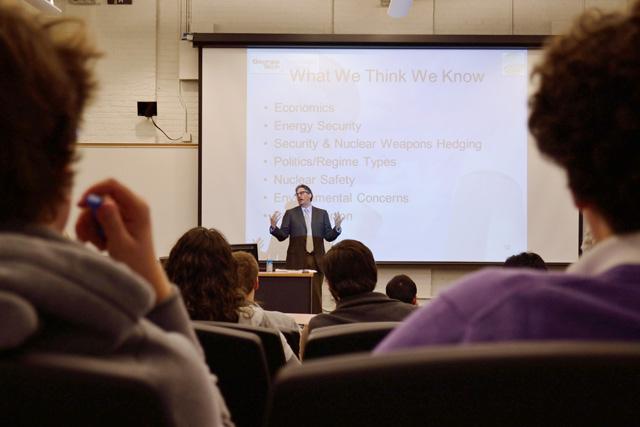Since the Japanese nuclear reactor crisis of Fukushima in 2011, the future of nuclear energy and public safety have reached questionable crossroads. An event Monday night aimed to inform students on the introcacies of a nuclear-powered future.
N.C. State’s School of Public and International Affairs hosted an event Monday to discuss the future and viability of nuclear power on a global scale.
Adam N. Shulberg, an associate professor of international affairs at Georgia Tech spoke on the subject.
Shulberg said nuclear-power scientists in the U.S. have used two contrasting definitions of nuclear power since the 1950s. He said he thinks nuclear energy has an identity crisis in this context.
“Is nuclear energy this warm and fuzzy thing,” Shulberg said, “[or] this monster we made it out to be to intimidate the Russians?”
Shulberg said he believes nations invest in nuclear energy for a variety reasons including energy security and economic stimulation.
A nation’s political leanings are a major factor in how it uses its nuclear agenda according to Shulberg. He said authoritarian-led countries, like Iran, attempt to stockpile nuclear weapons to build a powerful reputation.
Shulberg attempted to dispel popular myths and falsehoods about nuclear energy. Shulberg said he does not believe in the “Siamese Twins” myth that there is a link between countries pursuing nuclear power initiatives and those seeking nuclear weapons programs.
He predicts nuclear energy use will experience a resurgence among established countries as opposed to a renaissance in the future. Shulberg said he expects there will be a “deepening rather than a widening” of nuclear powered nations going forward.
Korea, Russia, India and China are nations Shulberg said he believes will play a crucial role in the future of developing the energy source.
Six percent of the world’s total energy use stems from nuclear power and 13.5 percent of the global electricity generation currently comes from the source, according to Shulberg. He said 30 countries and Taiwan (also known as the Republic of China) have invested in this field of energy.
Shulberg said to the audience that while there have been very few nuclear power-related accidents, it is difficult to overcome lingering societal scars left by the nuclear catastrophes at Three Mile Island, Chernobyl and most recently Fukushima Dai-ichi.
The “Fukushima Effect” quieted many supporters of nuclear power as the world took notice of a Japanese nuclear plant that leaked radioactive waste following a magnitude 9.0 earthquake and tsunami in March 2011.
The leakage led to a 30-kilometer evacuation zone around the facility and the closing of the plant in April 2011.
“The psychological impacts of Fukushima resonates in another part of the world,” Shulberg said.
What had been built up to be an “unbridled sense of optimism” had quickly turned to a “pervasive sense of pessimism,” according to Shulberg.
Shulberg also serves as the Co-director of the Center for International Strategy, Technology and Policy at Georgia Tech.
His latest book was released in Jan. 2013 and is titled The Nuclear Renaissance and International Security.








